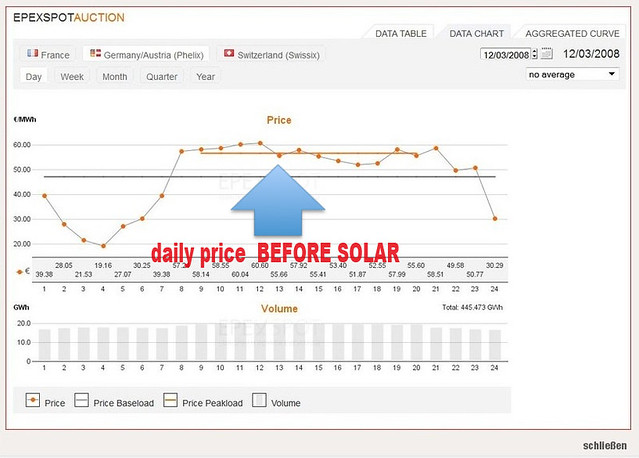This is a pretty good indication of how our energy debate in America is driven by oil, gas, and coal public relations bullshit not reality.
While our government has been licking around the edges of alternative energy and politely nodding when oil company execs tell us it's not cost competitive yet, Germany has jumped into it in a big way.
The result?
The peak price of electricity over the course of a day dropped 40%, and 25% of their gas generators may be closed.
The peak price of electricity over the course of a day dropped 40%, and 25% of their gas generators may be closed.
Why are we still talking about deep water drilling and pipelines for tar sand and shale oil, which are a half step above turning coal into gasoline?
Because only big money can drill oil or turn asphalt into usable fuel, so they can control the supply and therefore price. Once PV's are in place, it's a hell of a lot harder to explain price fluctuations when the ''fuel,'' the sun rays, are constant.
Because only big money can drill oil or turn asphalt into usable fuel, so they can control the supply and therefore price. Once PV's are in place, it's a hell of a lot harder to explain price fluctuations when the ''fuel,'' the sun rays, are constant.
Obama is doing more on this than past presidents, but we need to catch up to Germany, and the sooner we do, the less of a stranglehold big oil will have on our economy and foreign policy, and the harder it will be for power companies to blackmail us for billions and even turn out the lights as they did here in California at the beginning of the Bush administration.
We need to demand that our government get out in front, not just in research and demonstration projects, but in getting these kinds of power plants online and displacing fossil fuel NOW.
Tell the White House and your corrupt Congress critters to build it fast and build it NOW.
EXCERPT:
The first graph illustrates what a typical day on the electricity market in Germany looked like in March four years ago; the second illustrates what is happening now, with 25GW of solar PV installed across the country. Essentially, it means that solar PV is not just licking the cream off the profits of the fossil fuel generators — as happens in Australia with a more modest rollout of PV — it is in fact eating their entire cake.
Deutsche Bank solar analyst Vishal Shah noted in a report last month that EPEX data was showing solar PV was cutting peak electricity prices by up to 40%, a situation that utilities in Germany and elsewhere in Europe were finding intolerable. “With Germany adopting a drastic cut, we expect major utilities in other European countries to push for similar cuts as well,” Shah noted.
Analysts elsewhere said one quarter of Germany’s gas-fired capacity may be closed, because of the impact of surging solar and wind capacity. Enel, the biggest utility in Italy, which had the most solar PV installed in 2011, highlighted its exposure toreduced peaking prices when it said that a €5/MWh fall in average wholesale prices would translate into a one-third slump in earnings from the generation division.
SOURCE


No comments:
Post a Comment